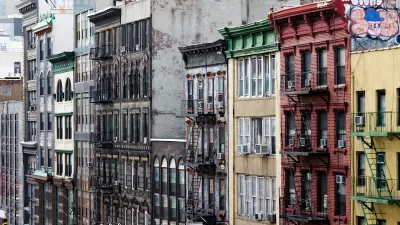In a bid to address concerns about vacation rentals in residential neighborhoods, the San Diego Planning Commission recommends cutting the number of short-term rentals in the city in half.

After years of complaints about loud guests and threats to long-term renters, San Diego leaders are evaluating a proposalto reduce the number of permitted short-term rentals by 50%. "Beyond the disruption the short-term rentals bring with a revolving door of strangers, they destabilize neighborhoods and reduce needed permanent housing supply," Reginald Jones of the Jacobs Center for Neighborhood Innovation told the San Diego Union-Tribune. "They should ultimately be banned from residential areas." Homeowners and renters have both expressed concerns about the effects of short-term rentals on neighborhood character and the rental market, citing Airbnb and its ilk as a major driver of displacement, instability, and scarcity for long-term renters.
Other experts seem less sure, asserting that any new policies should balance the needs of property owners with neighbors and other stakeholders. According to Gary London of London Moeder Advisors, eliminating short-term rentals would have almost no effect on the broader housing crisis faced by many Californians. Ray Major of the San Diego Association of Governments (SANDAG) agreed, saying that while short-term rentals do need regulation, property owners who depend on rental income should be allowed to operate rentals "within a set of reasonable guidelines."
The plan, endorsed by the city's Planning Commission, still requires approval by the San Diego City Council.

Alabama: Trump Terminates Settlements for Black Communities Harmed By Raw Sewage
Trump deemed the landmark civil rights agreement “illegal DEI and environmental justice policy.”

Planetizen Federal Action Tracker
A weekly monitor of how Trump’s orders and actions are impacting planners and planning in America.

The 120 Year Old Tiny Home Villages That Sheltered San Francisco’s Earthquake Refugees
More than a century ago, San Francisco mobilized to house thousands of residents displaced by the 1906 earthquake. Could their strategy offer a model for the present?

In Both Crashes and Crime, Public Transportation is Far Safer than Driving
Contrary to popular assumptions, public transportation has far lower crash and crime rates than automobile travel. For safer communities, improve and encourage transit travel.

Report: Zoning Reforms Should Complement Nashville’s Ambitious Transit Plan
Without reform, restrictive zoning codes will limit the impact of the city’s planned transit expansion and could exclude some of the residents who depend on transit the most.

Judge Orders Release of Frozen IRA, IIJA Funding
The decision is a victory for environmental groups who charged that freezing funds for critical infrastructure and disaster response programs caused “real and irreparable harm” to communities.
Urban Design for Planners 1: Software Tools
This six-course series explores essential urban design concepts using open source software and equips planners with the tools they need to participate fully in the urban design process.
Planning for Universal Design
Learn the tools for implementing Universal Design in planning regulations.
Clanton & Associates, Inc.
Jessamine County Fiscal Court
Institute for Housing and Urban Development Studies (IHS)
City of Grandview
Harvard GSD Executive Education
Toledo-Lucas County Plan Commissions
Salt Lake City
NYU Wagner Graduate School of Public Service





























